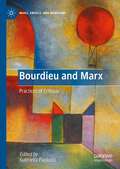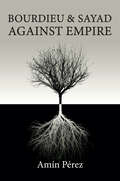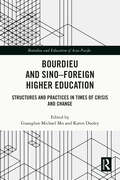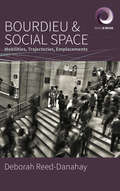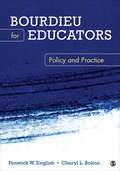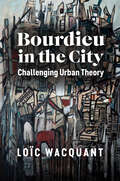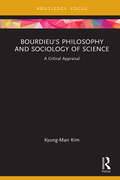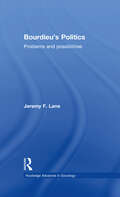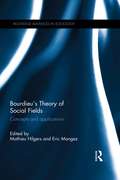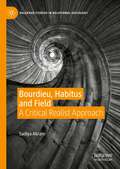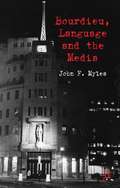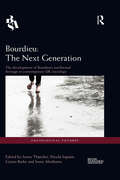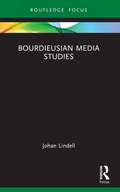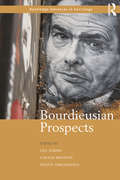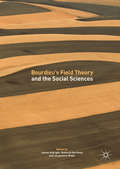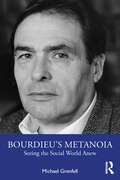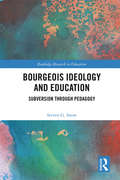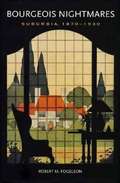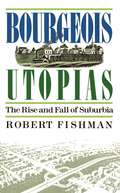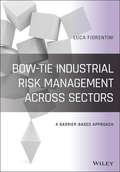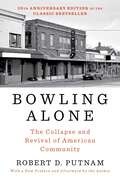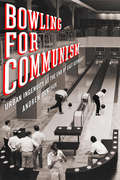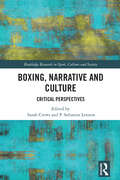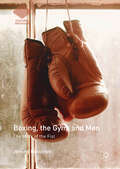- Table View
- List View
Bourdieu and Marx: Practices of Critique (Marx, Engels, and Marxisms)
by Gabriella PaolucciThis new book gathers together essays concerning the strategic modes of appropriation that Bourdieu practiced with regard to Marx, together with their various outcomes. It is especially devoted to the practice of critique that both thinkers exercised vigilantly throughout their careers, as this is the terrain on which we can best illuminate the debt that Bourdieu acknowledged to Marx. Ongoing dialogue with the entire body of Marxian critique is a constant in Bourdieu's writings. This is most clearly evidenced by the adoption of a critical perspective on the social world that denotes a massive Marxian presence. It is reinforced by the repeated references to Marx’s texts that the sociologist scatters throughout his works. Indeed, in the interlinked set of critiques underpinning the architecture of his work, in the plethora of questions he raises, and in the scientific practice he adopts, Bourdieu attaches himself to the Marxian model — notwithstanding his polemical remarks and his own deviations, or, we might even say, by virtue of them. The book is divided into three interconnected sections for ease of access: critique of domination, critique of economic practices and theories, and critique of ideology. As the first volume in English to explore the relationship between Bourdieu and Marx, this book is vital reading for students and scholars of social and anthropological theory.
Bourdieu and Sayad Against Empire: Forging Sociology in Anticolonial Struggle
by Amín PérezPierre Bourdieu and Abdelmalek Sayad met in their twenties in the midst of the Algerian war of independence. From their first meeting, a strong intellectual friendship was born between the French philosopher and the activist from the colony, nourished by the same desire to understand the world in order to change it. The work of both men was driven by the necessity of putting knowledge to use, whether by unveiling the relations of domination that structured life in Algeria or by opening emancipatory perspectives for the Algerian people. Colonies were, of course, a customary site of ethnographic work, but Bourdieu and Sayad refused to sacrifice scientific rigor to political expediency, even as Algeria descended deeper into war. Indeed, the act of understanding as a political commitment to the transformation of society lay at the heart of their project. Based on extensive interviews and deep archival work, Amín Pérez rediscovers the anticolonial origins of the pathbreaking social thought of these brilliant thinkers. Bourdieu and Sayad, he argues, forged another way of doing politics, laying the foundations of a revolutionary pedagogy, not just for anticolonial liberation but for true social emancipation.
Bourdieu and Sino–Foreign Higher Education: Structures and Practices in Times of Crisis and Change (Bourdieu and Education of Asia Pacific)
by Guanglun Michael Mu Karen DooleyBourdieu’s sociology has traditionally been confined to the limits of its French national context. This edited collection seeks to challenge these boundaries, applying Bourdieu’s analysis of practice to Chinese education as it gains relevance and attention around the globe. This book stems from the conviction that empirical investigation and conceptual inventiveness are needed to understand the historical and contextual particularities of Sino-foreign higher education. It brings the sociology of Pierre Bourdieu to the specificity of higher education in and for China and the multi-scalar complexity of higher education beyond the nation. Aggregating recent Bourdieu-informed investigations of empirical worlds of Sino-foreign higher education, the volume mainly considers two problems: structures and strategies of advantage behind institutional and individual action in Sino-foreign higher education; and student participation in the practices of that higher education. The volume probes the potential of Bourdieusian theory and methodology for understanding Chinese higher education beyond the nation. This book is written to engage with the intellectual work of both established scholars and higher degree research students within China and beyond. The empirical studies provide useful insights for educational leaders in Chinese higher education sectors and in the universities of English-dominant western countries where students and researchers from China have been a growing presence. The theoretical and methodological discussions will be pertinent to scholars who are interested in Bourdieu’s sociology and sociology of higher education.
Bourdieu and Social Space: Mobilities, Trajectories, Emplacements (Worlds in Motion #6)
by Deborah Reed-DanahayFrench sociologist and anthropologist Pierre Bourdieu’s relevance for studies of spatiality and mobility has received less attention than other aspects of his work. Here, Deborah Reed-Danahay argues that the concept of social space, central to Bourdieu’s ideas, addresses the structured inequalities that prevail in spatial choices and practices. She provides an ethnographically informed interpretation of social space that demonstrates its potential for new directions in studies of mobility, immobility, and emplacement. This book traces the links between habitus and social space across the span of Bourdieu’s writings, and places his work in dialogue with historical and contemporary approaches to mobility.
Bourdieu for Educators: Policy and Practice
by Fenwick W. English Cheryl L. BoltonEducational change and reform on a larger scale Bourdieu for Educators: Policy and Practice brings the revolutionary research and thinking of Pierre Bourdieu (1930-2002) of France to public educational leaders in North America, Canada, Australia, and the U.K. This text brings Bourdieu’s work into the arena of elementary and secondary educational reform and change, and offers policy, research, and practice discussions. Authors Fenwick W. English and Cheryl L. Bolton use Bourdieu to challenge the standards movement in different countries, the current vision of effective management, and the open-market notion connecting pay to performance. The text shows that connecting pay to performance won’t improve education for the poorest group of school students in the U.S., Canada, or the U.K., regardless of how much money is spent trying to erase the achievement gap. The authors lay out the bold educational agenda of Pierre Bourdieu by demonstrating that educational preparation must take into account larger socioeconomic-political realities in order for educational change and reform to make an impact.
Bourdieu for Educators: Policy and Practice
by Fenwick W. English Cheryl L. BoltonEducational change and reform on a larger scale Bourdieu for Educators: Policy and Practice brings the revolutionary research and thinking of Pierre Bourdieu (1930-2002) of France to public educational leaders in North America, Canada, Australia, and the U.K. This text brings Bourdieu’s work into the arena of elementary and secondary educational reform and change, and offers policy, research, and practice discussions. Authors Fenwick W. English and Cheryl L. Bolton use Bourdieu to challenge the standards movement in different countries, the current vision of effective management, and the open-market notion connecting pay to performance. The text shows that connecting pay to performance won’t improve education for the poorest group of school students in the U.S., Canada, or the U.K., regardless of how much money is spent trying to erase the achievement gap. The authors lay out the bold educational agenda of Pierre Bourdieu by demonstrating that educational preparation must take into account larger socioeconomic-political realities in order for educational change and reform to make an impact.
Bourdieu in the City: Challenging Urban Theory
by Loïc WacquantBuilding on three decades of comparative research on marginality, ethnicity, and penality in the postindustrial metropolis, Loïc Wacquant offers a novel interpretation of Pierre Bourdieu as urban theorist. He invites us to explore the city through what he calls the trialectic of symbolic space (the mental categories through which we perceive and organize the world), social space (the distribution of capital in its different forms), and physical space (the built environment). On this reading, Bourdieu’s topological sociology gives us the tools both to energize and also to challenge the canon of urban studies and to redraw their theoretical landscape. Compact and incisive, Bourdieu in the City will be of interest to students and scholars in sociology, anthropology, geography, urban studies, urban planning, architecture, and social theory.
Bourdieu's Philosophy and Sociology of Science: A Critical Appraisal (Routledge Studies in Social and Political Thought)
by Kyung-Man KimThis book explores Pierre Bourdieu's philosophy and sociology of science, which, though central to his thought, have been largely neglected in critical examinations of his work. Addressing the resultant confusion that surrounds Bourdieu's sociologized philosophy of science, it expounds his epistemology and sociology of science, situating it within the context of Anglo-American post-positivist philosophy of science and shedding light on the critique of relativist sociology of science that emerges from his field theory. From a detailed critique of Bourdieu's reflexive sociology and his attempt to enhance the uneasy epistemic status of the social sciences, the author draws on the thought of Jürgen Habermas to suggest critical ethnography as a way of going beyond Bourdieu’s critical theory. As such, Bourdieu's Philosophy and Sociology of Science will appeal to sociologists, philosophers, and scholars across the social sciences with interests in the work of Bourdieu and the sociology and philosophy of science.
Bourdieu's Politics: Problems and Possiblities (Routledge Advances in Sociology #Vol. 22)
by Jeremy F. LaneIn the last decade of his career, the French sociologist Pierre Bourdieu became involved in a series of high-profile political interventions, defending the cause of striking students and workers, speaking out in the name of illegal immigrants, the homeless and the unemployed, challenging the incursion of the market into the field of artistic and intellectual production. The first sustained analysis of Bourdieu's politics, this study seeks to assess the validity of his claims as to the distinctiveness and superiority of his own field theory as a tool of political analysis.
Bourdieu's Theory of Social Fields: Concepts and Applications (Routledge Advances in Sociology)
by Mathieu Hilgers Eric MangezBourdieu’s theory of social fields is one of his key contributions to social sciences and humanities. However, it has never been subjected to genuine critical examination. This book fills that gap and offers a clear and wide-ranging introduction to the theory. It includes a critical discussion of its methodology and relevance in different subject areas in the social sciences and humanities. Part I "theoretical investigations" offers a theoretical account of the theory, while also identifying some of its limitations and discussing several strategies to overcome them. Part II "Education, culture and organization" presents the theory at work and highlights its advantages and disadvantages. The focus in Part III devoted to "The State" is on the formation and evolution of the State and public policy in different contexts. The chapters show the usefulness of field theory in describing, explaining and understanding the functioning of the State at different stages in its historical trajectory including its recent redefinition with the advent of the neoliberal age. A last chapter outlines a postcolonial use of the theory of fields.
Bourdieu, Habitus and Field: A Critical Realist Approach (Palgrave Studies in Relational Sociology)
by Sadiya AkramThis innovative book argues that establishing an ontological framework makes a substantial difference to Pierre Bourdieu’s core concepts of habitus and field. In doing so it addresses the charges of determinism, tautology, and circularity that have long been directed at habitus and field. Teasing out Bourdieu’s ontology, the book offers a novel critical realist reading of Bourdieu, arguing that while Bourdieu explored the epistemological basis of his key concepts, he neglects their ontological underpinnings, and that elaborating on this adds a layer of depth and complexity which enriches Bourdieu’s project. In addition to articulating the synergies between Roy Bhaskar’s critical realism and Bourdieu’s oeuvre, this book extends Bourdieu’s insights in new and exciting directions by developing an ontologically informed Bourdieusian account of institutions as explored through the lens of institutional racism and by outlining a unique methodological approach to habitus.
Bourdieu, Language and the Media
by John F. MylesThis book engages with key theoretical and analytical issues in the field of media, communication and cultural studies. Using case studies of radio, internet, text messaging and photojournalism, it deploys Bourdieu's ideas to reveal how language in the media is implicated in broader social patterns of 'symbolic violence'.
Bourdieu: The Development of Bourdieu's Intellectual Heritage in Contemporary UK Sociology (Sociological Futures)
by Nicola Ingram Jessie Abrahams Ciaran Burke Jenny ThatcherThis book will give unique insight into how a new generation of Bourdieusian researchers apply Bourdieu to contemporary issues. It will provide a discussion of the working mechanisms of thinking through and/or with Bourdieu when analysing data. In each chapter, individual authors discuss and reflect upon their own research and the ways in which they put Bourdieu to work. The aim of this book is not to just to provide examples of the development of Bourdieusian research, but for each author to reflect on the ways in which they came across Bourdieu’s work, why it speaks to them (including a reflexive consideration of their own background), and the way in which it is thus useful in their thinking. Many of the authors were introduced to Bourdieu’s works after his death. The research problems which the individual authors tackle are contextualised in a different time and space to the one Bourdieu occupied when he was developing his conceptual framework. This book will demonstrate how his concepts can be applied as "thinking tools" to understand contemporary social reality. Throughout Bourdieu’s career, he argued that sociologists need to create an epistemological break, to abandon our common sense – or as much as we can – and to formulate findings from our results. In essence, we are putting Bourdieu to work to provide a structural constructivist approach to social reality anchored through empirical reflexivity.
Bourdieusian Media Studies (Routledge Focus on Media and Cultural Studies)
by Johan LindellBourdieusian Media Studies illustrates the merits of Pierre Bourdieu’s cultural sociological approach in the field of media studies, explicating exactly what a “Bourdieusian” analysis of media would entail, and what new understandings of the digital media landscape would emerge from such an analysis.The author applies the Bourdieusian concepts of social field, capital, and habitus to understand the social conditions of media and cultural production, media users’ practices and preferences, and the power dynamics entailed in social media networks. Based on a careful illumination of Bourdieu’s concepts, epistemological assumptions, and methodological approach, the book presents a range of case studies covering television production, the field of media studies itself, media use, and social media networks.Illustrating the craft of Bourdieusian media studies and shedding new light on key dynamics of digital media culture, this book will appeal to scholars and students working in media studies, media theory, sociology of media, digital media, and cultural production.
Bourdieusian Prospects (Routledge Advances in Sociology)
by Caragh Brosnan Lisa Adkins Steven ThreadgoldBourdieusian Prospects considers the ongoing relevance of Bourdieu's social theory for contemporary social science. Breaking with the tendency to reflect on Bourdieu's legacies, it brings established and emergent scholars together to debate the futures of a specifically Bourdieusian sociology. Driven by a central leitmotif in Bourdieu’s oeuvre, namely, that his work not be blindly appropriated but actively interpreted, contributors to this volume set out to map the potentials of Bourdieusian inflected social science. While for many social scientists the empirical and theoretical developments of the twenty-first century mark a limit point of Bourdieusian social theory, this collection charts both how and why a Bourdieusian sociology has a future, which is crucial for the ongoing development and roll out of an engaged, relevant and critical social science.
Bourdieu’s Field Theory and the Social Sciences: Operationalising And Extending Bourdieu's Field Analysis
by James Albright Deborah Hartman Jacqueline WidinHighlighting the conceptual work at the heart of Pierre Bourdieu's reflexive sociology, this cutting edge collection operationalizes Bourdieusian concepts in field analysis. Offering a unique range of explorations and reflections utilizing field analysis, the eighteen chapters by prominent Bourdieusian scholars and early career scholars synthesize key insights and challenges scholars face when going 'beyond the fields we know'. The chapters offer examples from discipline contexts as diverse as cultural studies, poetry, welfare systems, water management, education, journalism and surfing and provide demonstrations of theorizing within practical examples of field analysis. One of the foremost social philosophers and sociologists of the twentieth century, Bourdieu is widely known in cultural studies and education and his approaches are increasingly being taken up in health, social work, anthropology, family studies, journalism, communication studies and other disciplines where an analysis of the interplay between individuals and social structures is relevant. With its unique interdisciplinary focus, this book provides a useful guide to doing field analysis and working with Bourdieusian methods research, as well as key reading for methodology courses at post-graduate level.
Bourdieu’s Metanoia: Seeing the Social World Anew
by Michael GrenfellBourdieu once commented that what was needed was a ‘new gaze’ on the social world – a metanoia. This book describes this view and how to do it. Based on biographical detail and the socio-political contexts which surrounded him, it sets out his vision of society and culture. Grounded on the distinction between traditional and modern worlds, it shows how ethnographic experience led Bourdieu to an intellectual epiphany. It demonstrates the growth of his conceptual tools and the emergence of ‘field theory’ in various contexts: law, religion, fashion, sport, culture, fine art, philosophy, literature and politics. The book offers an up-to-date, extensive account of Bourdieu, his work and its significance. It centres on philosophical questions of social experience and intellectual practice. Based around his entire oeuvre, it features recent posthumous publications in French, providing important insights for the first time into his way of viewing the world. Including issues of the state, neoliberalism and resistance, this book explores the ways in which the social, philosophical and political came together for Bourdieu to shape how we see ourselves and our place in the contemporary world – a metanoia. Being both an introductory and advanced text, it is a valuable resource for the newcomer to Bourdieu as well as the experienced researcher. It will be of interest to undergraduates, postgraduates, researchers of Bourdieu’s work in the areas of sociology, media, philosophy, religion, economics, architecture, cultural studies, education, music, journalism, gender studies, politics, the law, fine arts and linguistics.
Bourgeois Ideology and Education: Subversion Through Pedagogy
by Steven SnowThis book identifies the origins and central assertions of bourgeois ideology as well as the reasons for their persuasive power, and offers pedagogical tools to weaken them. The author suggests techniques for use in the classroom, the community and the imagination that subvert negative stereotypes about poor people and individualist explanations for socio-economic status. Written from an ecumenical socialist perspective combining Marxist, neo-Marxist, and anarchist perspectives, this book utilizes a broad interdisciplinary scope, encompassing political theory, religion, political psychology, and literature.
Bourgeois Nightmares: Suburbia, 1870-1930
by Robert M. FogelsonThe quintessential American suburbs, with their gracious single-family homes, large green lawns, and leaf-shaded streets, reflected not only residents' dreams but nightmares, not only hopes but fears: fear of others, of racial minorities and lowincome groups, fear of themselves, fear of the market, and, above all, fear of change. These fears, and the restrictive covenants that embodied them, are the subject of Robert M. Fogelson's fascinating new book. As Fogelson reveals, suburban subdividers attempted to cope with the deep-seated fears of unwanted change, especially the encroachment of "undesirable" people and activities, by imposing a wide range of restrictions on the lots. These restrictions ranged from mandating minimum costs and architectural styles for the houses to forbidding the owners to sell or lease their property to any member of a host of racial, ethnic, and religious groups. These restrictions, many of which are still commonly employed, tell us as much about the complexities of American society today as about its complexities a century ago.
Bourgeois Utopias: The Rise and Fall of Suburbia
by Robert FishmanA noted urban historian traces the story of the suburb from its origins in nineteenth-century London to its twentieth-century demise in decentralized cities like Los Angeles.
Bow-Tie Industrial Risk Management Across Sectors: A Barrier-Based Approach
by Luca FiorentiniBOW-TIE INDUSTRIAL RISK MANAGEMENT ACROSS SECTORS Explore an approachable but rigorous treatment of systematic barrier-based approaches to risk management and failure analysisIn Bow-Tie Industrial Risk Management Across Sectors: A Barrier-Based Approach, accomplished researcher and author Luca Fiorentini delivers a practical guide to risk management tools, with a particular emphasis on a systematic barrier-based approach called “bow-tie.” The book includes discussions of two barrier-based methods, Bow-Tie and Layers of Protection Analysis (LOPA), for risk assessment, and one barrier-based method for incident analysis, Barrier Failure Analysis (BFA). The author also describes a traditional method–Root Cause Analysis–and three quantitative methods–FMEA/FMECA, Fault Tree (FTA), and Event Tree (ETA) with a discussion about their link with barriers.Written from the ground up to be in full compliance with recent ISO 31000 standards on enterprise risk management, and containing several case studies and examples from a variety of industries, Bow-Tie Industrial Risk Management Across Sectors also contains discussions of international standards dealing with common risks faced by organizations, including occupational health and safety, industrial safety, functional safety, environmental, quality, business continuity, asset integrity, and information security.Readers will also benefit from the inclusion of:A thorough introduction to the Bow-Tie method, including its practical application in risk management workflow from ISO 31000, the history of Bow-Tie, related methods, and the application of Bow-Tie in qualitative and quantitative waysAn exploration of Barrier Failure Analysis, including events, timelines, barriers, causation paths, and multi-level causesA practical discussion of how to build a Barrier Failure Analysis, including fact finding, event chaining, identifying barriers, assessing barrier states, causation analysis, and recommendationsA concise treatment of Bow-Tie construction workflow, including a step-by-step guidePerfect for engineers and other professionals working in risk management, Bow-Tie Industrial Risk Management Across Sectors: A Barrier-Based Approach will also earn a place in the libraries of advanced undergraduate and graduate students studying risk management and seeking a one-stop reference on the “bow-tie” approach and barrier-based methods.
Bowling Alone: The Collapse and Revival of American Community
by Robert D. PutnamOnce we bowled in leagues, usually after work -- but no longer. This seemingly small phenomenon symbolizes a significant social change that Robert Putnam has identified in this brilliant volume, Bowling Alone, which The Economist hailed as "a prodigious achievement." Drawing on vast new data that reveal Americans' changing behavior, Putnam shows how we have become increasingly disconnected from one another and how social structures -- whether they be PTA, church, or political parties -- have disintegrated. Until the publication of this groundbreaking work, no one had so deftly diagnosed the harm that these broken bonds have wreaked on our physical and civic health, nor had anyone exalted their fundamental power in creating a society that is happy, healthy, and safe. Like defining works from the past, such as The Lonely Crowd and The Affluent Society,and like the works of C. Wright Mills and Betty Friedan, Putnam's Bowling Alone has identified a central crisis at the heart of our society and suggests what we can do.
Bowling for Communism: Urban Ingenuity at the End of East Germany
by Andrew DemshukBowling for Communism illuminates how civic life functioned in Leipzig, East Germany's second-largest city, on the eve of the 1989 revolution by exploring acts of "urban ingenuity" amid catastrophic urban decay. Andrew Demshuk profiles the creative activism of local communist officials who, with the help of scores of volunteers, constructed a palatial bowling alley without Berlin's knowledge or approval. In a city mired in disrepair, civic pride overcame resentment against a regime loathed for corruption, Stasi spies, and the Berlin Wall.Reconstructing such episodes through interviews and obscure archival materials, Demshuk shows how the public sphere functioned in Leipzig before the fall of communism. Hardly detached or inept, local officials worked around centralized failings to build a more humane city. And hardly disengaged, residents turned to black-market construction to patch up their surroundings.Because such "urban ingenuity" was premised on weakness in the centralized regime, the dystopian cityscape evolved from being merely a quotidian grievance to the backdrop for revolution. If, by their actions, officials were demonstrating that the regime was irrelevant, and if, in their own experiences, locals only attained basic repairs outside official channels, why should anyone have mourned the system when it was overthrown?
Boxing, Narrative and Culture: Critical Perspectives (Routledge Research in Sport, Culture and Society)
by Sarah Crews P. Solomon LennoxBoxing, Narrative and Culture: Critical Perspectives is the first interdisciplinary response to the dominant boxing narratives that are produced, performed and circulated in commercial boxing culture. This collection includes global perspectives on boxing. It highlights the diverse range of bodies and communities that engage with boxing practices but are oftentimes overlooked and overwritten by popular narrative tropes and misconceptions of the sport. These interdisciplinary and global perspectives engage with boxing’s shared narrative resources, offering new readings and insights on how and what boxing performs and for whom. The contributors to this collection are academics, artists, amateur boxers, and/or coaches who provide a culture critique of boxing. The work shows how boxing practices are performed and channelled by individuals and communities who access and utilise boxing culture as a means of physical enquiry, political statement, and community building. These contributions challenge the notion that boxing is a sport reserved for masculine bodies adorned as heroes, warriors, or victims of the sport. Exploring key themes in socio-cultural studies including gender, race, community, media and performance, this book is fascinating reading for anybody with an interest in physical culture, sport studies, cultural studies, gender studies, cultural geography, critical race theory, labour studies, performance studies or media studies.
Boxing, the Gym, and Men: The Mark of the Fist (Cultural Sociology)
by Jérôme BeauchezThis book explores the lived experiences of boxers in a French banlieue, largely populated by people from working-class and immigrant backgrounds. Jérôme Beauchez, who joined in the men’s daily workouts for many years, analyzes the act of boxing as a high-stakes confrontation that extends well beyond the walls of the gym. Exploring the physical and existential realities of combat, the author provides a multifaceted “thick description” of this world and shows that the violence faced by the gym’s members is not so much to be found in the ring as in the adversity of everyday racism and social exclusion. Boxing can therefore be understood as an act of resistance that is about more than simply fighting an opponent and that reflects all the existential struggles facing these men who are both stigmatized and socially dominated by race and class.
